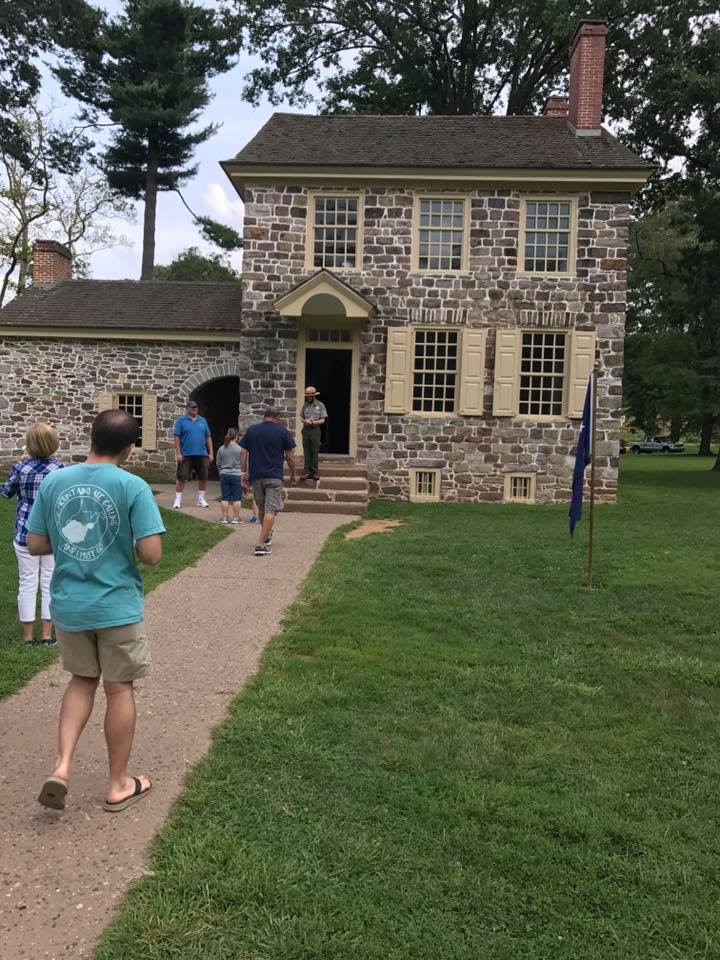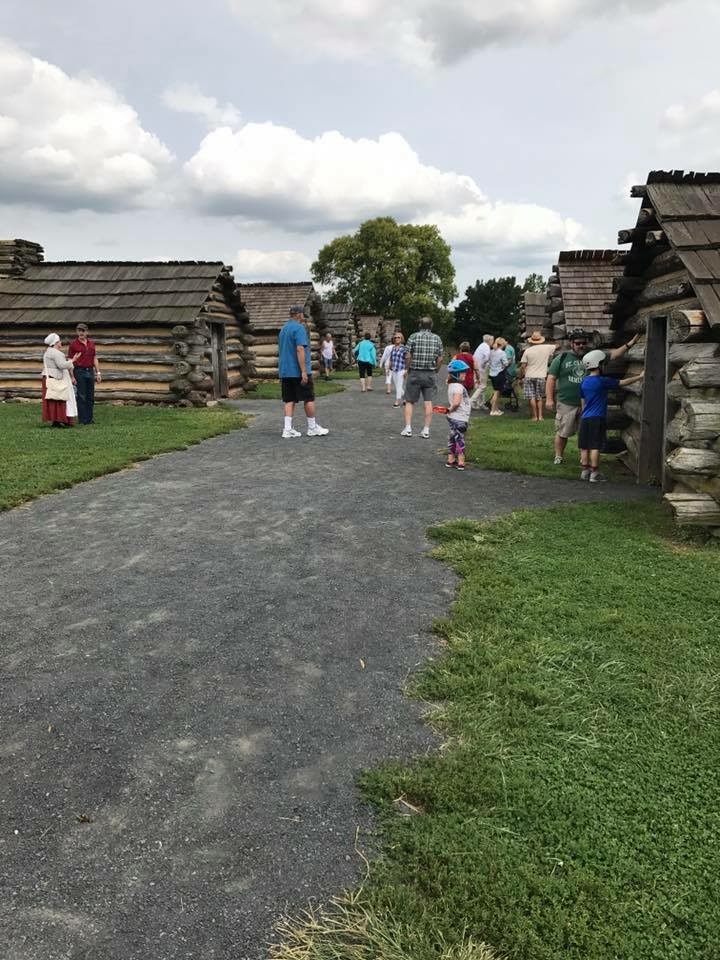How George Washington Survived America's Worst Winter
Page 1 of 1
 How George Washington Survived America's Worst Winter
How George Washington Survived America's Worst Winter
Two-hundred forty years ago, George Washington was not a fan of the snow. Were he back home in Virginia, looking out of the Mount Vernon mansion’s windows as snowflakes came to rest onto his neatly manicured gardens, the scene might have been idyllic. Instead, he was subleasing the home of Isaac Potts. Outside his window 11,000 soldiers of the Continental Army, along with 500 women and children, were even more miserable than he was at Valley Forge, Pennsylvania.
The previous winter, 1776-77, had been better for Washington. On Christmas night, he had led a force across the icy Delaware river and surprised a Hessian garrison at Trenton, New Jersey. He’d followed up that victory with another at Trenton a few days later when the British counterattacked. He then marched around the British army, captured their supplies in Princeton, and ensconced himself in the New Jersey highlands, daring the British to assault his position. The Cause had seemed alive again and new recruits flooded into his army’s ranks.
However, the empire struck back hard in 1777. Two major British armies assailed Congressional forces. One, was bottled up and defeated in the woods of upstate New York near Saratoga Springs. The other, swept past Washington’s forces and captured the young nation’s capital, Philadelphia, on September 26. Congress exiled itself in York, Pennsylvania, and on December 19, Washington marched his army into Valley Forge, the snow red with blood from his shoeless soldiers’ feet.
Valley Forge is depicted in American popular culture as a purgatory for the American Cause. A place where the nation suffered so that freedom could spring forth. But the truth is, compared to the entire population of the rebelling colonies, very few people suffered at Valley Forge. Most Americans, ardent patriots though they might be, were at home with their families while 11,000 enlisted soldiers, many of them poor, non-white, and marginalized members of their home communities, huddled together shoeless around their campfires. They risked the prime years of their lives on only the hope that the American Revolution would benefit them after the war.
Washington tried to make the best of a bad situation. He ordered that on Christmas Day, soldiers would “draw provisions, to complete their rations.” That sounded good, the start of the United States military’s attempt to provide troops in combat zones a holiday treat. However, Washington’s soldiers wouldn’t be receiving glazed hams, mashed potatoes, and cranberry sauce fresh from the fields of nearby New Jersey. No, that’s what the British occupying Philadelphia would dine on. For the Americans hemming George III’s troops into the City of Brotherly Love, it was a menu of something generously called bread and boiled beef “of such vile Quality, as to render it a poor Succedaneum for Food.” Oh, and that Christmas feast for the Continental soldiers, it would empty the army’s larders. More supplies, daily promised by Congress, had still not arrived.
Washington worked throughout the winter in 1777-78. He planned foraging expeditions to alleviate the army’s food shortages. Maybe nearby Tory supporters of the Crown government had supplies he could requisition and pay for with depreciating Continental currency. He met with his officers and asked them to not resign their commissions. They replied with inquiries of why they should sustain with their lives a cause that their fellow citizens couldn’t be bothered to support with marginal taxation. He also wrote to Congress again and again, asking them where were his army’s supplies. “Although [Congressmen] seem to have little feeling for the naked and distressed Soldier,” Washington wrote, “I feel superabundantly for them, and from my soul pity those miseries, which it is neither in my power to relieve or prevent.” It was an easy thing to stand by one’s political convictions while in a “comfortable room by a good fire side,” he berated them, but harder to do it while on, “a cold, bleak hill, and sleep under frost & snow without Clothes or Blankets.”
Numerous Continental Army soldiers wrote that they thought their nation had abandoned them during the winter of 1777-78, but they knew that Washington had not. There he was, in the Potts house, dispatch riders galloping back and forth as the general devised ways to beg, borrow, and steal the supplies his soldiers needed. No soldier recounted seeing Washington walking amongst the troops patting them on the back. None witnessed him praying for the nation’s deliverance as snow came to rest on his soldiers. Instead, what they noticed was candles burning in the Potts house late into the night as Washington tried to get them food.
Washington probably took one last look out of the Potts house’s windows as he settled into bed each night throughout his time at Valley Forge. He maybe even wondered why he’d taken a job that had now kept him away from Mount Vernon for a third Christmas in a row, and for a cause that seemed all but lost. What Washington could not haven known as he stared out those windows into harsh winter darkness, was that even then the answer to any prayers he may have said was on its way. A ship, the Belle Poulle, was fitting out for a trip to the United States with all possible haste. She was not bringing any beautiful hens like her name might suggest, but something even more important for the Continental Army, news that France would soon enter the war alongside the American rebels. Washington was getting a gift from Louis XVI, bonne année.
Joseph Stoltz is a historian at the Fred W. Smith National Library for the Study of George Washington at Mount Vernon. The views expressed here are his own.
https://www.thedailybeast.com/how-george-washington-survived-americas-worst-winter?ref=home
The previous winter, 1776-77, had been better for Washington. On Christmas night, he had led a force across the icy Delaware river and surprised a Hessian garrison at Trenton, New Jersey. He’d followed up that victory with another at Trenton a few days later when the British counterattacked. He then marched around the British army, captured their supplies in Princeton, and ensconced himself in the New Jersey highlands, daring the British to assault his position. The Cause had seemed alive again and new recruits flooded into his army’s ranks.
However, the empire struck back hard in 1777. Two major British armies assailed Congressional forces. One, was bottled up and defeated in the woods of upstate New York near Saratoga Springs. The other, swept past Washington’s forces and captured the young nation’s capital, Philadelphia, on September 26. Congress exiled itself in York, Pennsylvania, and on December 19, Washington marched his army into Valley Forge, the snow red with blood from his shoeless soldiers’ feet.
Valley Forge is depicted in American popular culture as a purgatory for the American Cause. A place where the nation suffered so that freedom could spring forth. But the truth is, compared to the entire population of the rebelling colonies, very few people suffered at Valley Forge. Most Americans, ardent patriots though they might be, were at home with their families while 11,000 enlisted soldiers, many of them poor, non-white, and marginalized members of their home communities, huddled together shoeless around their campfires. They risked the prime years of their lives on only the hope that the American Revolution would benefit them after the war.
Washington tried to make the best of a bad situation. He ordered that on Christmas Day, soldiers would “draw provisions, to complete their rations.” That sounded good, the start of the United States military’s attempt to provide troops in combat zones a holiday treat. However, Washington’s soldiers wouldn’t be receiving glazed hams, mashed potatoes, and cranberry sauce fresh from the fields of nearby New Jersey. No, that’s what the British occupying Philadelphia would dine on. For the Americans hemming George III’s troops into the City of Brotherly Love, it was a menu of something generously called bread and boiled beef “of such vile Quality, as to render it a poor Succedaneum for Food.” Oh, and that Christmas feast for the Continental soldiers, it would empty the army’s larders. More supplies, daily promised by Congress, had still not arrived.
Washington worked throughout the winter in 1777-78. He planned foraging expeditions to alleviate the army’s food shortages. Maybe nearby Tory supporters of the Crown government had supplies he could requisition and pay for with depreciating Continental currency. He met with his officers and asked them to not resign their commissions. They replied with inquiries of why they should sustain with their lives a cause that their fellow citizens couldn’t be bothered to support with marginal taxation. He also wrote to Congress again and again, asking them where were his army’s supplies. “Although [Congressmen] seem to have little feeling for the naked and distressed Soldier,” Washington wrote, “I feel superabundantly for them, and from my soul pity those miseries, which it is neither in my power to relieve or prevent.” It was an easy thing to stand by one’s political convictions while in a “comfortable room by a good fire side,” he berated them, but harder to do it while on, “a cold, bleak hill, and sleep under frost & snow without Clothes or Blankets.”
Numerous Continental Army soldiers wrote that they thought their nation had abandoned them during the winter of 1777-78, but they knew that Washington had not. There he was, in the Potts house, dispatch riders galloping back and forth as the general devised ways to beg, borrow, and steal the supplies his soldiers needed. No soldier recounted seeing Washington walking amongst the troops patting them on the back. None witnessed him praying for the nation’s deliverance as snow came to rest on his soldiers. Instead, what they noticed was candles burning in the Potts house late into the night as Washington tried to get them food.
Washington probably took one last look out of the Potts house’s windows as he settled into bed each night throughout his time at Valley Forge. He maybe even wondered why he’d taken a job that had now kept him away from Mount Vernon for a third Christmas in a row, and for a cause that seemed all but lost. What Washington could not haven known as he stared out those windows into harsh winter darkness, was that even then the answer to any prayers he may have said was on its way. A ship, the Belle Poulle, was fitting out for a trip to the United States with all possible haste. She was not bringing any beautiful hens like her name might suggest, but something even more important for the Continental Army, news that France would soon enter the war alongside the American rebels. Washington was getting a gift from Louis XVI, bonne année.
Joseph Stoltz is a historian at the Fred W. Smith National Library for the Study of George Washington at Mount Vernon. The views expressed here are his own.
https://www.thedailybeast.com/how-george-washington-survived-americas-worst-winter?ref=home
Guest- Guest
 Re: How George Washington Survived America's Worst Winter
Re: How George Washington Survived America's Worst Winter
We were there at the end of August. Our tour guide was superb. Pott’s house is tiny yet Martha and George were crammed in with a multitude of officers. Still it was better than one of the tiny log huts with up to 10 men in each one. How anyone survived that place is amazing.

Cass- the Nerd Queen of Nerds, the Lover of Books who Cooks
- Posts : 6617
Join date : 2014-01-19
Age : 56
 Re: How George Washington Survived America's Worst Winter
Re: How George Washington Survived America's Worst Winter


First one Potts House
Second, a group of replica log huts for the enlisted.

Cass- the Nerd Queen of Nerds, the Lover of Books who Cooks
- Posts : 6617
Join date : 2014-01-19
Age : 56
 Re: How George Washington Survived America's Worst Winter
Re: How George Washington Survived America's Worst Winter
Great photo's Cass.
I knew had an interest here and glad you liked the article
I knew had an interest here and glad you liked the article
Guest- Guest
 Re: How George Washington Survived America's Worst Winter
Re: How George Washington Survived America's Worst Winter
The lady reenactor on the left of the second picture was very informative. 10 men living, cooking, toileting etc...in what was basically a sealed unit, the door being opened once or twice a day.
All the trees and forests that we saw were all gone. For miles and miles.
It truly brought home how desperate a position they were in.
All the trees and forests that we saw were all gone. For miles and miles.
It truly brought home how desperate a position they were in.

Cass- the Nerd Queen of Nerds, the Lover of Books who Cooks
- Posts : 6617
Join date : 2014-01-19
Age : 56
 Similar topics
Similar topics» The Unexpected Legacy of George Washington
» Thomas Jefferson’s Weird Fear of George Washington
» All the President’s Humility: What We Can Learn From Young George Washington
» Jessica Krug: George Washington University professor says she lied about being black
» The French General Who Outfoxed George Washington—and Helped Him Save America
» Thomas Jefferson’s Weird Fear of George Washington
» All the President’s Humility: What We Can Learn From Young George Washington
» Jessica Krug: George Washington University professor says she lied about being black
» The French General Who Outfoxed George Washington—and Helped Him Save America
Page 1 of 1
Permissions in this forum:
You cannot reply to topics in this forum
» TOTAL MADNESS Great British Railway Journeys among shows flagged by counter terror scheme ‘for encouraging far-right sympathies
» Interesting COVID figures
» HAPPY CHRISTMAS.
» The Fight Over Climate Change is Over (The Greenies Won!)
» Trump supporter murders wife, kills family dog, shoots daughter
» Quill
» Algerian Woman under investigation for torture and murder of French girl, 12, whose body was found in plastic case in Paris
» Wind turbines cool down the Earth (edited with better video link)
» Saying goodbye to our Queen.
» PHEW.
» And here's some more enrichment...
» John F Kennedy Assassination
» Where is everyone lately...?
» London violence over the weekend...
» Why should anyone believe anything that Mo Farah says...!?
» Liverpool Labour defends mayor role poll after turnout was only 3% and they say they will push ahead with the option that was least preferred!!!
» Labour leader Keir Stammer can't answer the simple question of whether a woman has a penis or not...
» More evidence of remoaners still trying to overturn Brexit... and this is a conservative MP who should be drummed out of the party and out of parliament!
» R Kelly 30 years, Ghislaine Maxwell 20 years... but here in UK...